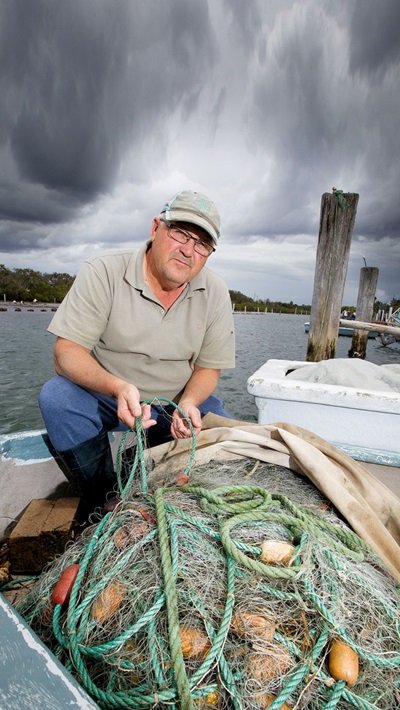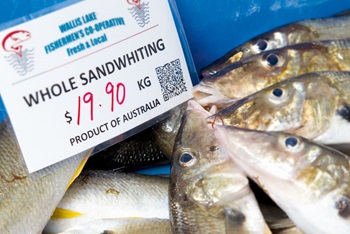The combination of recognised training and the promotion of professional expertise aims to improve the public perception and reputation of Australia’s fishing industry
By Catherine Norwood
 Greg Golby
Greg GolbyA new program has been launched in New South Wales aimed at helping fishers to regain pride in their profession. Successful completion of the program sees fishers rewarded with the title ‘OceanWatch Master Fisherman’, which recognises commercial fishers as highly skilled professionals who conduct themselves with integrity to ensure the best possible outcomes for their fishery as well as for their customers.
The program brings together fishers’ work practices, local and international codes of practice for responsible fishing, and the Australian Seafood Training Package.
Between September and November 2014 OceanWatch formally trained 58 fishers in the NSW Estuary General Fishery, including an assessment in Certificate 2, ‘Participate in Environmentally Sustainable Work Practices’.
Fishers who completed the training and have also previously completed maritime competency qualifications and food safety training have been recognised as OceanWatch Master Fishermen. These fishers now have their own personal web-based profile and a video of them has been linked to a quick response (QR) code that they can incorporate into their branding and product information.
Using a smartphone, consumers can quickly and easily access information about the fishers and their catch, their specific fishing operations, sustainability information and recipes, all housed on the OceanWatch website.
OceanWatch executive chairman Brad Warren has been a driving force behind the initiative. He says in 2012 the FRDC’s Fisheries Research Advisory Body (FRAB) in NSW put out a call for research priorities. Industry groups identified the need to address the poor public profile of fishers and professional development as high priorities.
Responding to these needs, the FRDC funded the ‘Professionalising Industry’ project, which incorporates the OceanWatch Master Fisherman program. After a year spent developing the program and course materials, OceanWatch ran six courses as a pilot, focusing on the Estuary General Fishery on the NSW north coast.
The Estuary General Fishery is a multi-method and multi-species fishery that incorporates finfish and crustaceans. Harvesting techniques include mesh netting, fish seine, fish traps, crab traps, hand gathering and hand lines.
Code of practice
Brad Warren says OceanWatch established a code of practice in the fishery, which was adopted by industry several years ago. This project reviewed and updated it in line with the United Nations Food and Agriculture Organization’s Code for Responsible Fishing and changes were adopted to ensure the fishery’s code of practice aligned with the international standard.
The revised code was then used as the framework for the Master Fisherman’s course materials.
OceanWatch also considered the National Seafood Training Package and worked with a registered training provider to ensure the program included training and assessment that is formally recognised. Training materials were developed and delivered by experienced fishers and others working in the industry to ensure the program was relevant and practical in terms of day-to-day fishing operations.
A discussion about the need for fishers to generate community acceptance in order to continue accessing public resources was an integral part of the training program. This included the importance of ‘professional’ behaviour within the industry, and taking in environmental, consumer and community perspectives, as well as fishers’ perspectives.
“These discussions have highlighted the benefits of establishing a code of practice for the industry, complying with that code, and being able to promote it within the community,” Brad Warren says.
Project partners with OceanWatch and the FRDC include the Master Fish Merchants Association, the NSW Fishermen’s Co-operatives Association, Sydney Fish Market, the NSW Department of Primary Industries, the Professional Fishermen’s Association (NSW) and the NSW Fishing Industry Training Committee.
It was a major achievement of the project to reach consensus on the course program objectives and content despite fisheries management changes underway in NSW, which have caused uncertainty within the industry.
“However, the framework used in the OceanWatch Master Fisherman initial project in NSW is transportable to all Australian fisheries,” Brad Warren says. “It offers benefits for fishers, regulators and consumers by improving transparency of industry practices and access to science-based information.”
Feedback from participants has been positive about both the content of the training and the overall aims of the program, including the promotional aspects.
Master Fisherman
 Master Fisherman QR cpdes are already part of displays at the Wallis Lake Fishermen"s Co-operative.
Master Fisherman QR cpdes are already part of displays at the Wallis Lake Fishermen"s Co-operative. Photos: Shane Chalker
Among the inaugural group of Master Fishermen is Graeme Byrnes who fishes the NSW mid-north coast estuaries including Wallis Lake and Myall Lake, in the Foster region, and Tuggerah Lake, further south. He says for many of the participants the one-day program consolidated previous training and experience, while also providing information and training about new trends and emerging issues.
“It was a full day and it was a rigorous process. The Master Fisherman training content ranged across 12 or more different disciplines, everything from fish-handling techniques and the chemistry of safe food handling to reporting requirements and fishery regulations, marine pests, and threatened and endangered species.”
Graeme Byrnes is particularly keen to see the QR codes put into play. His operation is a small family one, just himself and his brother Phillip, and they focus on high-value catch including Sand Whiting, Blue Swimmer Crabs, Yellowfin Bream, Mud Crabs and Dusky Flathead.
“There’s a strong focus on provenance among the Wallis Lake fishers. We’re proud of our fishery and the way we do things, so we want to make sure the QR codes are reaching consumers to promote that provenance. All the hard work has been done to set up the accreditation and the information network. Now we have to follow through to make sure retailers put that link in front of their customers – not just in the local area, but in Sydney and other major population centres too.”
Operations manager at the Wallis Lake Fishermen’s Co-operative, Suzie McEnallay, says more than half of the members of the co-op took part in the Master Fisherman courses offered last year. There has been strong local support for the program and for the industry’s code of practice.
The co-op is keen to promote the professional recognition the OceanWatch program has given to its members and is already incorporating the fishers’ QR codes into its displays at its retail outlet at Tuncurry, which is a popular summer tourist destination.
“Locals may know how and where their fish are caught, but we have many visitors who don’t,” she says. “Any information we can put in front of the end consumer is important.”
Greg Golby
Greg Golby is chair of the Wallis Lake Fishermen’s Co-operative, a position he has held for the past two years. He has been a director of the co-op for five years, and an estuarine fisher in the Foster region of New South Wales for 30 years. He is also an accredited OceanWatch Master Fisherman.
He says the Master Fisherman’s course was both informative and a good affirmation that those attending were using industry best practice. He says the discussion about ‘social licence’ – what do fishers need to do to maintain public support for continued fishing? – was one of the most valuable parts of the program.
“People are becoming more seafood savvy and they want to ensure that their food is coming from a secure and sustainable supply. They want to have confidence in our product, and I think the OceanWatch program helps to achieve that,” Greg Golby says.
“As an industry, I think we also need to consider how fishers can work together to optimise harvest and market prices. But the fishing industry has operated for a long time on a competitive basis, and it will be difficult to change this approach.”
OceanWatch Master Fishermen
Recognised OceanWatch Master Fishermen have completed formal training and assessment, delivered by OceanWatch Australia and backed by the NSW Fishing Industry Training Committee. Training is linked to the Seafood Industry Training Package Competency Unit SFIEMS201b ‘Participate in Environmentally Sustainable Work Practices’.
It also incorporates aspects of responsible fishing including:
- product quality;
- threatened species handling and reporting;
- bycatch reduction devices and techniques;
- animal welfare;
- catch reporting and fisheries management;
- water quality, fish habitat and pollution;
- Indigenous fishing; and
- workplace health and safety.
Recognised OceanWatch Master Fishermen must also have completed food safety training and hold relevant maritime competency qualifications.
FRDC Research Code: 2013-024
More information
Brad Warren, brad@oceanwatch.org.au





